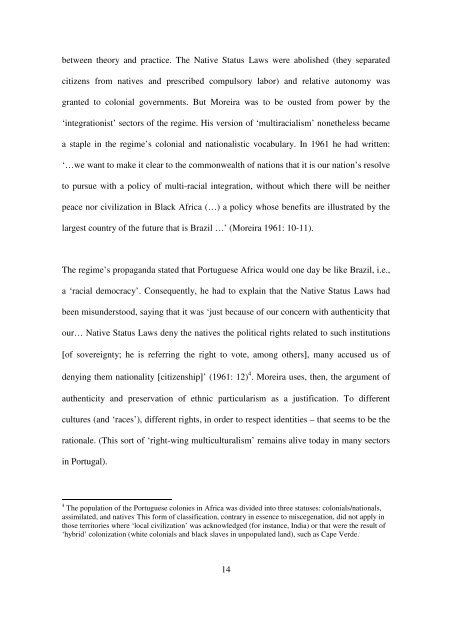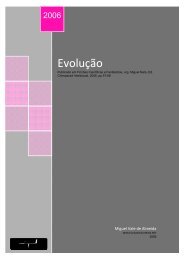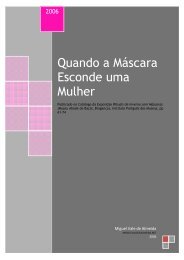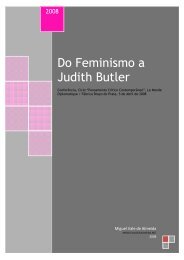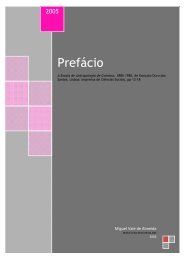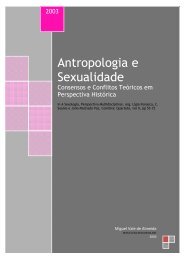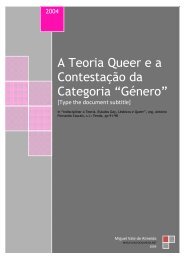On the Lusophone Postcolony: - Miguel Vale de Almeida
On the Lusophone Postcolony: - Miguel Vale de Almeida
On the Lusophone Postcolony: - Miguel Vale de Almeida
You also want an ePaper? Increase the reach of your titles
YUMPU automatically turns print PDFs into web optimized ePapers that Google loves.
etween <strong>the</strong>ory and practice. The Native Status Laws were abolished (<strong>the</strong>y separated<br />
citizens from natives and prescribed compulsory labor) and relative autonomy was<br />
granted to colonial governments. But Moreira was to be ousted from power by <strong>the</strong><br />
‘integrationist’ sectors of <strong>the</strong> regime. His version of ‘multiracialism’ none<strong>the</strong>less became<br />
a staple in <strong>the</strong> regime’s colonial and nationalistic vocabulary. In 1961 he had written:<br />
‘…we want to make it clear to <strong>the</strong> commonwealth of nations that it is our nation’s resolve<br />
to pursue with a policy of multi-racial integration, without which <strong>the</strong>re will be nei<strong>the</strong>r<br />
peace nor civilization in Black Africa (…) a policy whose benefits are illustrated by <strong>the</strong><br />
largest country of <strong>the</strong> future that is Brazil …’ (Moreira 1961: 10-11).<br />
The regime’s propaganda stated that Portuguese Africa would one day be like Brazil, i.e.,<br />
a ‘racial <strong>de</strong>mocracy’. Consequently, he had to explain that <strong>the</strong> Native Status Laws had<br />
been misun<strong>de</strong>rstood, saying that it was ‘just because of our concern with au<strong>the</strong>nticity that<br />
our… Native Status Laws <strong>de</strong>ny <strong>the</strong> natives <strong>the</strong> political rights related to such institutions<br />
[of sovereignty; he is referring <strong>the</strong> right to vote, among o<strong>the</strong>rs], many accused us of<br />
<strong>de</strong>nying <strong>the</strong>m nationality [citizenship]’ (1961: 12) 4 . Moreira uses, <strong>the</strong>n, <strong>the</strong> argument of<br />
au<strong>the</strong>nticity and preservation of ethnic particularism as a justification. To different<br />
cultures (and ‘races’), different rights, in or<strong>de</strong>r to respect i<strong>de</strong>ntities – that seems to be <strong>the</strong><br />
rationale. (This sort of ‘right-wing multiculturalism’ remains alive today in many sectors<br />
in Portugal).<br />
4 The population of <strong>the</strong> Portuguese colonies in Africa was divi<strong>de</strong>d into three statuses: colonials/nationals,<br />
assimilated, and natives . This form of classification, contrary in essence to miscegenation, did not apply in<br />
those territories where ‘local civilization’ was acknowledged (for instance, India) or that were <strong>the</strong> result of<br />
‘hybrid’ colonization (white colonials and black slaves in unpopulated land), such as Cape Ver<strong>de</strong>. .<br />
14


